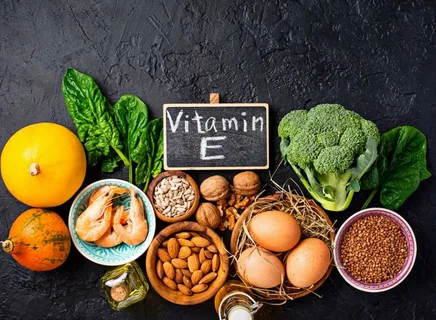Maintaining healthy skin is not only a matter of aesthetics but also a crucial aspect of overall health. Vitamins play a vital role in skin health, offering benefits that range from hydration and elasticity to protection against environmental damage. In this guide, we’ll explore the essential vitamins for skin health, how they work, and how to incorporate them into your diet and skincare routine.
The Importance of Vitamins for Skin Health
Vitamins are organic compounds that our bodies need in small amounts to function correctly. When it comes to skin health, certain vitamins are particularly beneficial due to their antioxidant properties, ability to support collagen production, and role in cellular repair and regeneration.
How Vitamins Impact Skin Health
Vitamins influence various aspects of skin health, including:
- Hydration and Moisture Retention: Some vitamins help maintain the skin’s moisture barrier, preventing dryness and flakiness.
- Collagen Production: Vitamins like C and A are critical for collagen synthesis, which keeps the skin firm and elastic.
- Protection Against UV Damage: Antioxidant vitamins protect the skin from harmful UV rays and environmental pollutants.
- Healing and Repair: Vitamins aid in the skin’s natural healing process, reducing inflammation and promoting cell regeneration.
Key Vitamins for Skin Health
Vitamin A
Benefits for Skin
Vitamin A is renowned for its ability to promote healthy skin cell production. Retinoids, the active form of Vitamin A, are often used in skincare products to treat acne, reduce fine lines, and even out skin tone.
Sources of Vitamin A
- Dietary Sources: Carrots, sweet potatoes, spinach, and kale.
- Topical Sources: Retinoid creams, serums, and over-the-counter retinol products.
Vitamin C
Benefits for Skin
Vitamin C is a potent antioxidant that helps protect the skin from free radical damage caused by UV exposure. It also plays a crucial role in collagen synthesis, which helps maintain skin elasticity and reduce wrinkles.
Sources of Vitamin C
- Dietary Sources: Citrus fruits, strawberries, bell peppers, and broccoli.
- Topical Sources: Vitamin C serums and creams.
Vitamin E
Benefits for Skin
Vitamin E is another powerful antioxidant that helps protect the skin from environmental stressors and UV damage. It also has anti-inflammatory properties that can soothe and repair the skin.
Sources of Vitamin E
- Dietary Sources: Nuts, seeds, spinach, and avocado.
- Topical Sources: Vitamin E oils and creams.
Vitamin D
Benefits for Skin
Vitamin D is essential for skin cell growth and repair. It helps maintain the skin’s barrier function and can reduce inflammation. A deficiency in Vitamin D can lead to dry, flaky skin.
Sources of Vitamin D
- Dietary Sources: Fatty fish, fortified dairy products, and mushrooms.
- Sun Exposure: The body produces Vitamin D when the skin is exposed to sunlight.
Vitamin K
Benefits for Skin
Vitamin K plays a vital role in blood clotting, which is essential for healing wounds and bruises. It also helps reduce the appearance of dark circles under the eyes and can improve skin elasticity.
Sources of Vitamin K
- Dietary Sources: Leafy greens like kale, spinach, and broccoli.
- Topical Sources: Creams and serums containing Vitamin K.
Incorporating Vitamins into Your Skincare Routine
Dietary Intake
Consuming a balanced diet rich in fruits, vegetables, nuts, and seeds can provide the necessary vitamins for healthy skin. A diet that includes a variety of these foods ensures that you get a broad spectrum of essential nutrients.
Topical Application
In addition to dietary intake, topical application of vitamins can provide targeted benefits to the skin. Products like serums, creams, and oils that contain vitamins A, C, E, and K can address specific skin concerns such as wrinkles, pigmentation, and dryness.
Supplements
In some cases, supplements may be necessary to meet your vitamin needs, especially if dietary intake is insufficient. Consult with a healthcare provider before starting any supplement regimen to ensure it is appropriate for your needs.
FAQs
How do I know if I need more vitamins for my skin?
Common signs of vitamin deficiencies affecting the skin include dryness, flakiness, slow wound healing, and increased susceptibility to infections. If you notice these symptoms, it may be beneficial to consult with a healthcare provider for a proper assessment.
Can I use vitamin supplements to improve my skin health?
Yes, vitamin supplements can be beneficial for skin health, particularly if you have a deficiency. However, it is important to consult with a healthcare provider before starting any supplements to ensure they are necessary and safe for you.
Are there any side effects of using vitamin-enriched skincare products?
While vitamin-enriched skincare products are generally safe, some people may experience irritation or allergic reactions. It is always best to perform a patch test before applying a new product to your entire face.
How long does it take to see results from vitamin-enriched skincare products?
The time it takes to see results can vary depending on the product and the individual. Generally, it may take a few weeks to a few months to notice significant improvements in skin health.
Can I use multiple vitamin-enriched products at the same time?
Yes, you can use multiple vitamin-enriched products simultaneously. However, it is important to introduce one product at a time to monitor how your skin reacts and to avoid potential interactions.
What is the best time of day to apply vitamin-enriched skincare products?
Vitamin C serums are typically applied in the morning to protect the skin from UV damage, while Vitamin A products like retinoids are best used at night to avoid sun sensitivity.
How can I naturally boost my vitamin intake for better skin?
Eating a balanced diet rich in fruits, vegetables, nuts, seeds, and whole grains can naturally boost your vitamin intake. Additionally, getting regular, safe sun exposure can help increase Vitamin D levels.
Are natural sources of vitamins better for skin health than supplements?
Natural sources of vitamins are generally preferred as they come with additional nutrients and benefits. However, supplements can be useful in cases of deficiency or when dietary intake is insufficient.
Can I get enough vitamins for my skin health through diet alone?
In many cases, a balanced diet can provide sufficient vitamins for skin health. However, factors like age, health conditions, and lifestyle may affect vitamin absorption and needs, making supplements necessary for some individuals.
How do environmental factors affect the vitamin needs of my skin?
Environmental factors such as pollution, UV exposure, and climate can increase the skin’s need for protective antioxidants like Vitamins C and E. It is important to adapt your skincare and dietary habits to your environment to maintain healthy skin.
Conclusion
Vitamins play a crucial role in maintaining healthy, radiant skin. By incorporating a balanced diet rich in essential vitamins, using vitamin-enriched skincare products, and considering supplements when necessary, you can support your skin’s health and appearance. Always consult with a healthcare provider to determine the best approach for your individual needs and to address any specific skin concerns you may have.
- Sculptra Surrey – Collagen Stimulation Therapy Near Hale, Surrey - June 1, 2025
- Profhilo Treatment Near Ockley, Surrey - May 31, 2025
- What Medical Conditions Prevent You From Getting Botox? - May 30, 2025

